8 Organic Coffee Brands Behind Science for Your Better Health
Organic coffee refers to coffee that is grown, processed, and produced without the use of synthetic chemicals, pesticides, herbicides, or fertilizers.
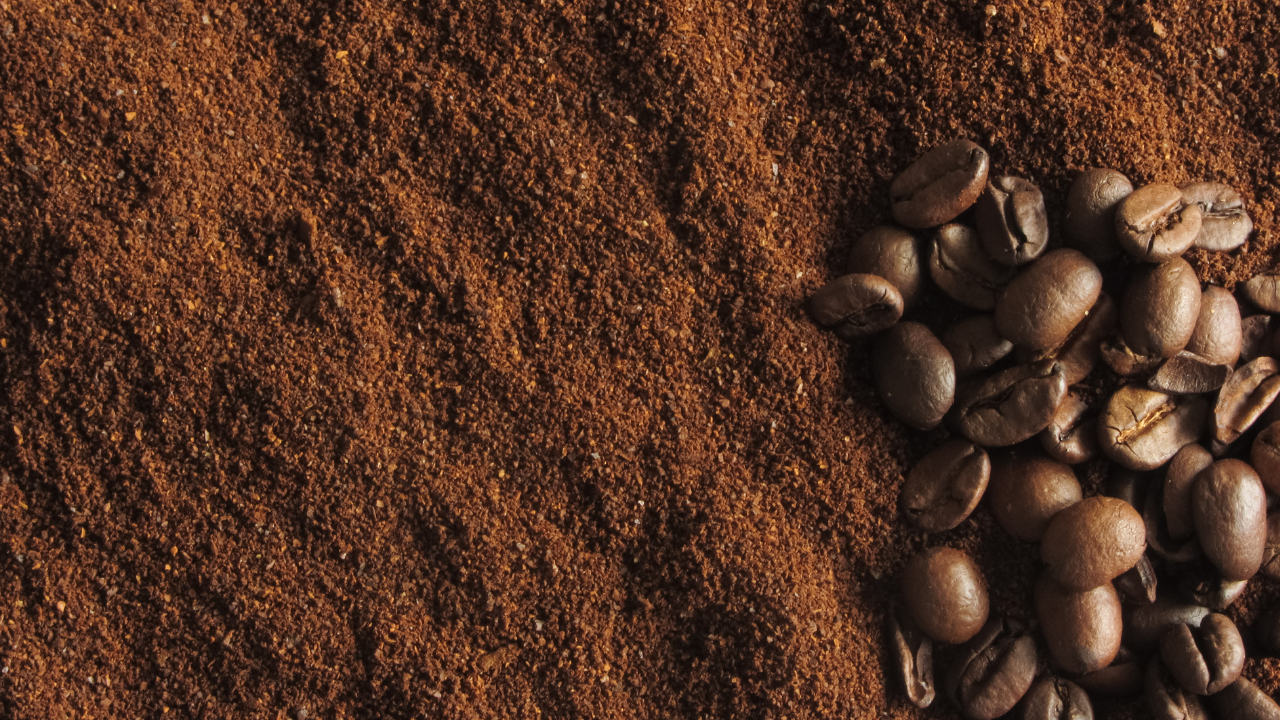
Organic coffee refers to coffee that is grown, processed, and produced without the use of synthetic chemicals, pesticides, herbicides, or fertilizers.
Public concerns over the negative environmental and health effects of agrochemicals in crop production have driven consumer demand for organic foods in the last 20 years ✅✅.
The cultivation and processing of organic coffee must adhere to strict guidelines and standards set by certifying organizations, such as the United States Department of Agriculture (USDA) or the European Union (EU).
Organic coffee farming promotes sustainable agricultural practices, biodiversity, and soil health ✅. The importance of organic coffee is evident in its benefits, not only for human health but also for the environment.
Organic crops also tend to have a richer flavor and higher antioxidant content of 20–40 % (and for some compounds more than 60 %) compared to conventionally grown crops ✅✅.
In addition, when compared to conventional coffee, organic coffee exhibited greater amounts of chlorogenic acid, caffeine, and trigonelline ✅.
In this article, we will explore what organic coffee is, why it is important, and how it differs from regular coffee.
Difference Between Organic and Regular Coffee
Organic coffee is grown and processed using environmentally friendly and sustainable methods that prioritize the health of the soil, ecosystem, and the people involved in its production.
Conventional coffee farming often relies on synthetic chemicals and industrial farming techniques.
Here's a comparison between regular and organic coffee in terms of growing and processing:
✔️ Soil preparation: Conventional coffee farming may use chemical fertilizers to increase soil fertility, whereas organic coffee farming relies on natural sources of nutrients like compost, animal manure, and plant-based materials ✅.
Using chemical fertilizers in conventional farming can worsen the effects on human health and resources compared to organic farming, as shown in the farming scenario analysis✅.
Similar to many other plants, coffee thrives in soil that is well-drained and able to retain moisture, such as sandy loam ✅, which also has a certain amount of organic material ✅. For optimal drainage and to avoid root diseases, the land should have a slope of 0.01-0.03% and maintain a pH level of 6.5-7.5.
✔️ Plant selection: In conventional coffee farming, farmers may choose high-yielding, disease-resistant coffee varieties, which sometimes require more chemical inputs to thrive. Organic coffee farming typically uses native or heirloom varieties that are well-adapted to local conditions.
The use of suitable seeds and planting material is crucial in achieving successful production, as it can result in increased yields and reduced losses ✅.
✔️ Planting and cultivation: Conventional coffee is often grown in full sun, with little or no shade. This can lead to soil erosion, loss of biodiversity, and increased use of chemical pesticides and fertilizers. Organic coffee is grown under a diverse canopy of shade trees, promoting biodiversity and reducing the need for synthetic chemicals.
In a conventional agroforestry system, shade trees and coffee plants exhibit a mutually beneficial utilization of soil water. The shade trees primarily obtain water from deeper soil layers, ranging from 15 to 120 cm depth, whereas the coffee plants rely on shallower water sources, typically found within 0 to 15 cm depth ✅.
Organic coffee agroforestry systems are more affected by shade trees in terms of their influence on soil nutrient availability and the food web compared to conventional systems. Under conventional management, the presence of shade, regardless of the type of shade tree, led to increased soil nutrient availability and fauna densities ✅.
Furthermore, shade levels in coffee plantations can be adjusted to minimize pest populations and enhance the positive impact of helpful microorganisms and animals ✅.
✔️ Pest and disease management: Conventional coffee farming may rely on synthetic pesticides and herbicides to control pests and diseases. Organic coffee farming uses natural methods such as biological controls, beneficial insects, and crop rotation to manage pests and diseases.
Spraying insecticides regularly is not recommended as it can harm useful parasites and predators ✅.
Crop rotations reduce pests, diseases, and weeds while improving soil quality, nutrient distribution, and biological activity ✅.
The use of organic and bio-fertilizers can aid in the effective utilization of phosphorus fertilizers in low-input farming systems, while also ensuring a sustainable environment for livelihoods ✅.
✔️ Harvesting: Both conventional and organic coffee cherries are typically handpicked when ripe. However, conventional coffee may also employ mechanical harvesting methods, which can result in a mix of ripe and unripe cherries.
✔️ Processing: Both conventional and organic coffee can undergo wet (washed) or dry (natural) processing methods. However, conventional coffee processing may use chemicals during the fermentation process to speed up the breakdown of mucilage, while organic coffee avoids chemical additives during processing.
✔️ Storage and transportation: Organic coffee beans must be stored separately from conventional beans to prevent contamination. The storage facilities must be clean and free of chemicals. During transportation, the beans are kept in bags made of natural fibers or other approved materials.
There are numerous advantages to using natural fibers, including but not limited to decreased environmental pollution, exceptional mechanical capabilities, lower density, a moderate weight-to-strength/stiffness ratio, and significant impact resistance ✅.
✔️ Roasting and packaging: Organic coffee roasters must adhere to strict guidelines to maintain the organic integrity of the beans. The roasting equipment must be free of chemical residues, and the packaging materials must be free of harmful substances.
✔️ Certification: To be labeled as organic, coffee must be certified by a recognized certifying organization, such as the USDA or EU. This certification process ensures that the coffee has been grown and processed according to the established organic standards.
Certification improves production standards and labeling generates economic and environmental benefits ✅.
Benefits of Organic Coffee
Organic coffee offers a range of benefits, both for human health and the environment.
✔️ Health Benefits: Organic coffee is free from synthetic chemicals, which means that it is healthier for the consumer.
Studies have shown that organic coffee contains more antioxidants and beneficial nutrients than regular coffee ✅✅✅. It is also free from harmful chemicals that can lead to health problems such as cancer and reproductive issues.
Caffeine's biological effects are associated with its ability to stimulate the mind and body, resulting in improved mental and physical performance in the short term ✅✅.
Research has shown that consistent consumption can lead to a lower chance of developing neurodegenerative diseases like Parkinson's ✅✅ and Alzheimer`s diseases ✅✅ in the long run.
The presence of caffeine in coffee is known to have positive effects such as contributing to its antioxidative properties ✅✅, reducing the occurrence of chronic liver diseases ✅✅, and exhibiting antibacterial properties against cariogenic ✅ and intestinal pathogenic bacteria ✅ in vitro.
✔️Environmental Benefits: Organic coffee farming practices help to promote biodiversity and protect ecosystems. The use of sustainable farming methods promotes healthy soil, reduces water consumption, and minimizes pollution.
The organic system showed greater levels of soil respiration and fluorescein diacetate activity, as well as higher macrofauna, microbial population, and microbial diversity indices. However, the conventional system had higher levels of urease activity ✅.
Organic coffee farms are also home to a wide variety of plant and animal species, which helps to maintain the natural balance of the ecosystem ✅.
Shade coffee plantations can harbor a comparable amount of biodiversity as forest habitats✅.
By choosing organic coffee, you can enjoy the health benefits of a pesticide-free product while also supporting environmentally sustainable farming practices.
8 Best Organic Coffee Brands:
Comparison of Top Organic Coffee Brands
There are many organic coffee brands on the market today, each with its unique characteristics and flavor profiles. Here is a brief overview of some of the top organic coffee brands:
Death Wish Coffee
Best feature: High caffeine content
Known for its strong, bold flavor, and is one of the world’s strongest coffees
Ideal for those who need an extra energy boost.

Kicking Horse Coffee
Best feature: Flavor variety and sustainability
This Canadian brand offers a wide range of flavors and roast profiles
All are made from fair trade, organic beans sourced from environmentally responsible farming practices

Coffee Don Pablo
Best feature: Quality Arabica beans
Coffee Don Pablo is known for its high-quality Arabica beans and smooth, low-acidic taste, offering a variety of roasts and flavors
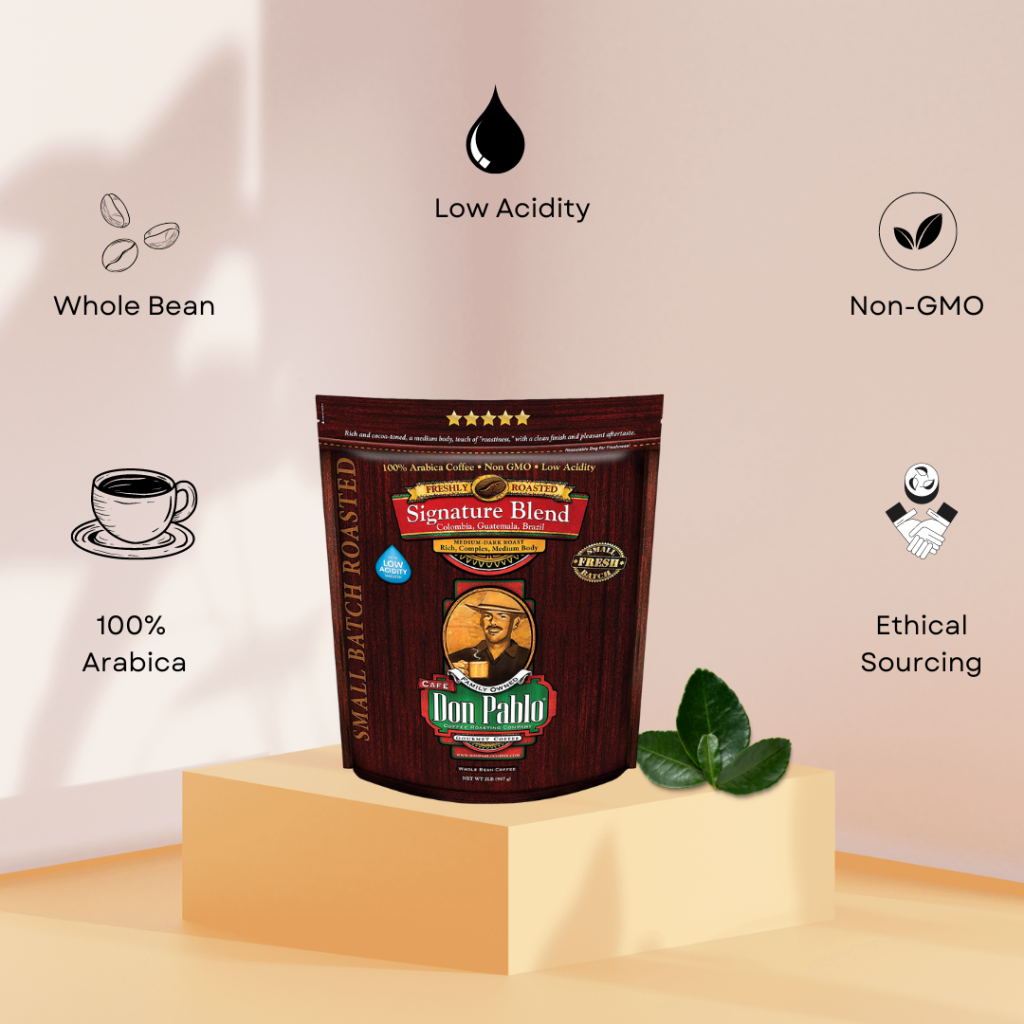
Camano Island Coffee Roasters
Best feature: Social and environmental responsibility
This brand focuses on organic, fair trade, and shade-grown coffee, ensuring environmentally friendly practices and supporting small-scale farmers
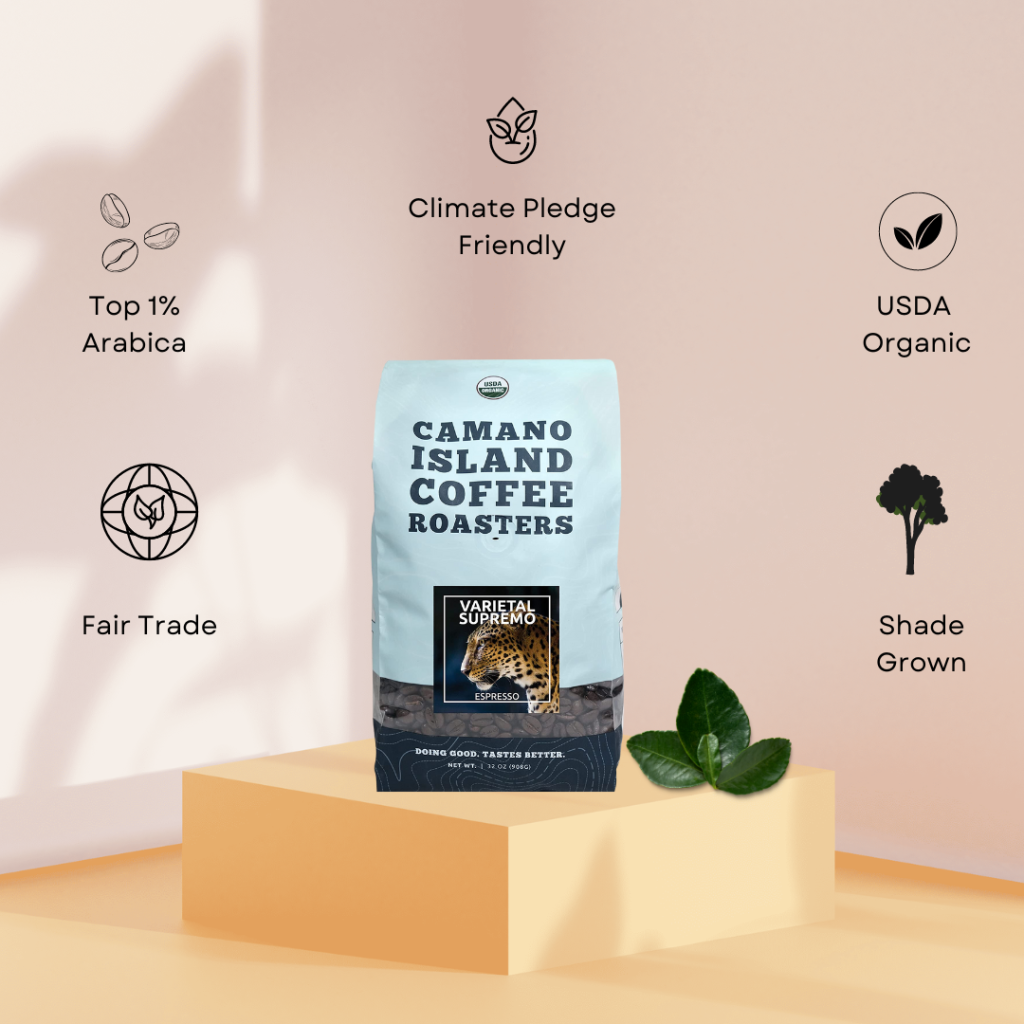
Lifeboost Coffee
Best feature: Health-focused
Lifeboost Coffee is known for its low-acid, mycotoxin-free, and single-origin beans
The ideal choice for health-conscious coffee drinkers
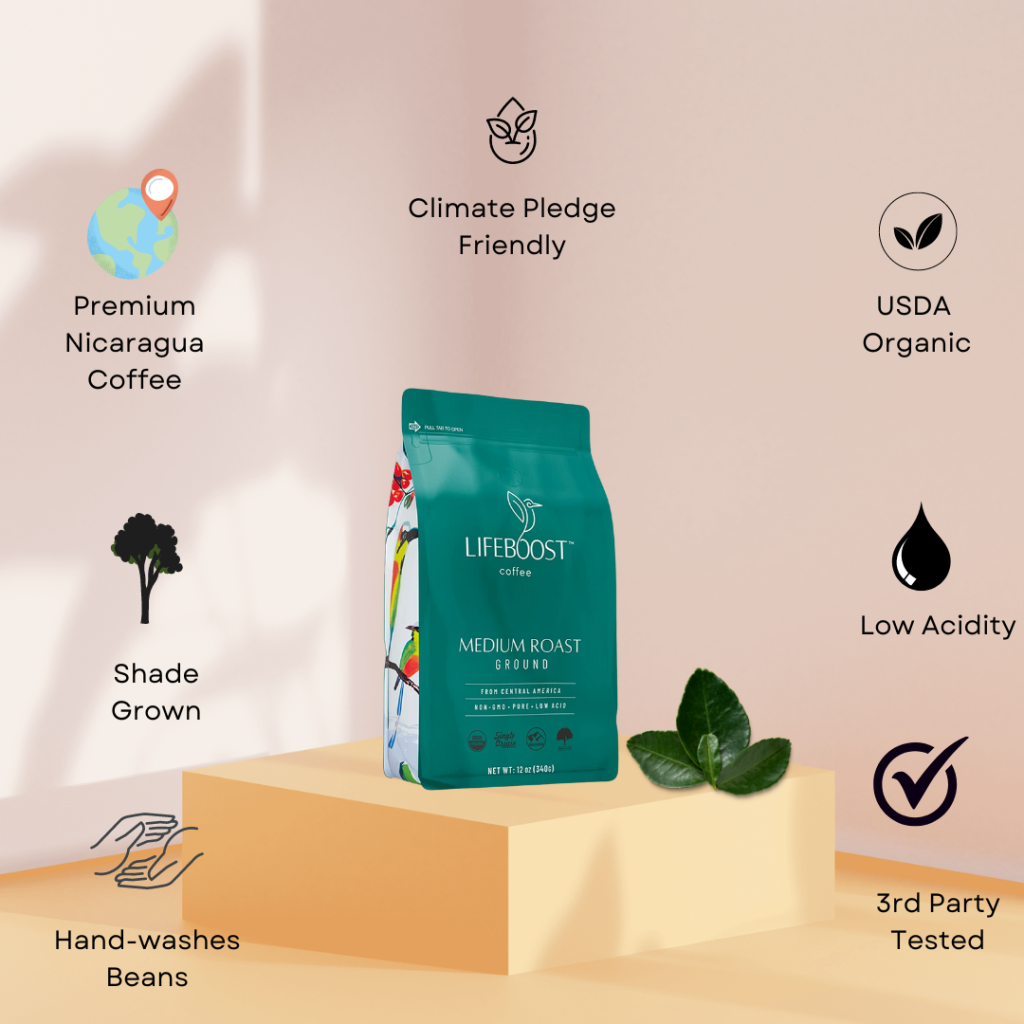
Stumptown Coffee Roasters
Best feature: Specialty coffee and direct trade relationships
Stumptown is known for its high-quality specialty coffee and commitment to building direct trade relationships with coffee farmers, ensuring fair prices and sustainable practices
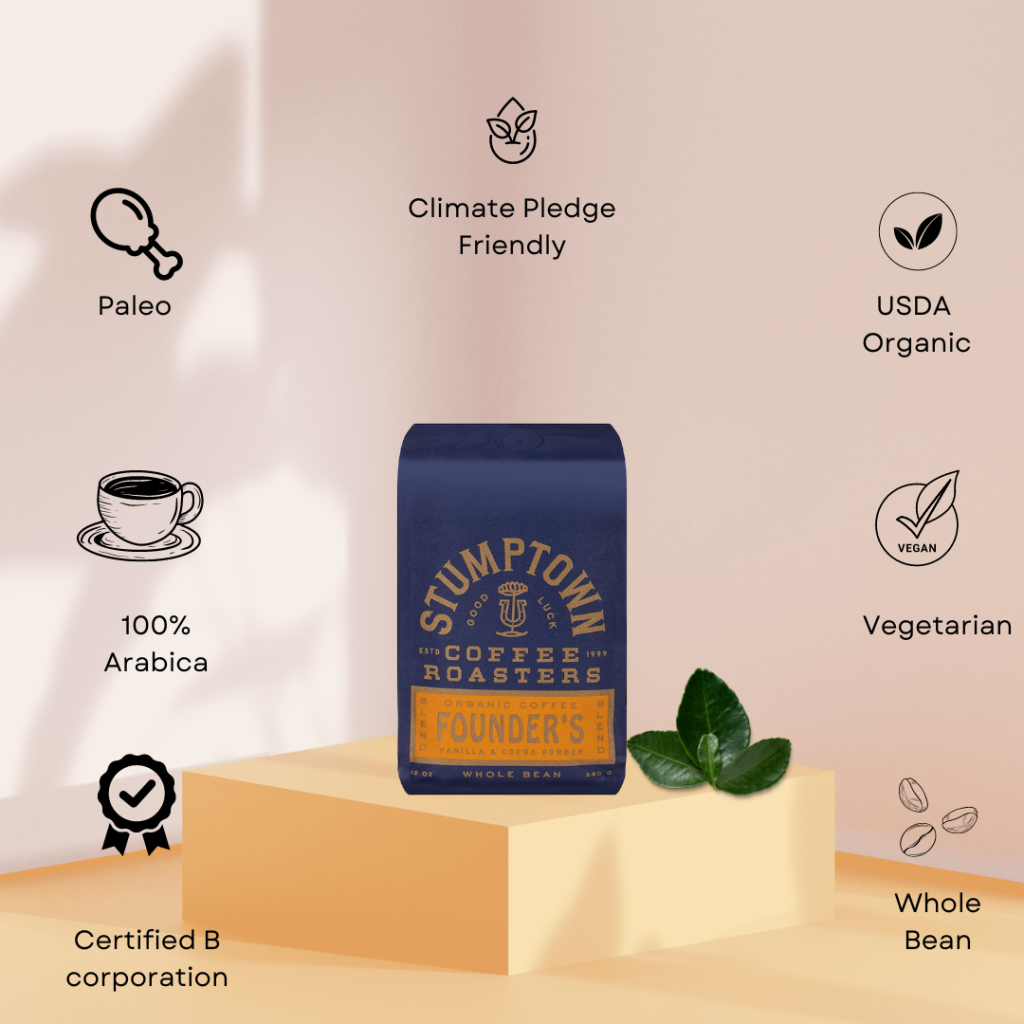
Java Planet
Best feature: Organic and fair trade certified
Java Planet offers a variety of organic, fair trade certified coffee beans, ensuring that their products are both environmentally friendly and socially responsible.
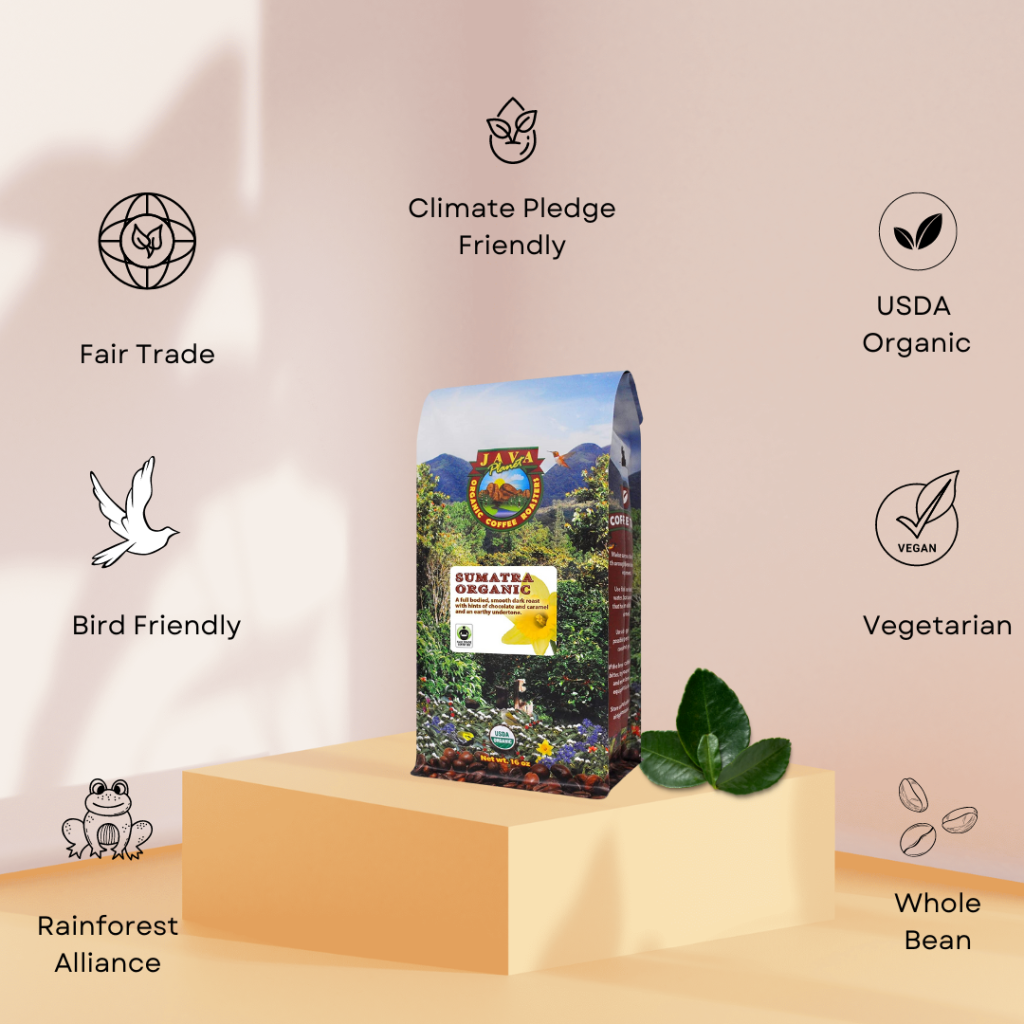
Bulletproof
Best feature: Unique production process for cognitive performance
Bulletproof Coffee is known for its unique production process that includes blending coffee with grass-fed butter and Brain Octane oil, which is designed to promote cognitive performance and sustained energy.

Each brand has its unique features, and the best choice for you will depend on your preferences, priorities, and taste.
How to Identify Organic Coffee
If you want to ensure that the coffee you are buying is organic, there are a few things to look for:
✔️ Look for the USDA Organic seal: The United States Department of Agriculture (USDA) has established organic standards that must be met for a product to be labeled as organic.
✔️ Check for other certifications: In addition to the USDA Organic seal, there are other certifications that can indicate that coffee is organic. These include Fair Trade, Rainforest Alliance, and Bird-Friendly certifications, among others.
✔️ Look for information on the packaging: Many coffee companies will include information on the packaging about their farming practices and whether or not their coffee is organic. Look for keywords such as "organic," "sustainable," or "pesticide-free" to help identify organic coffee.
Why Organic Coffee is More Expensive
The price of coffee is mainly determined by the expenses involved in growing and processing organic coffee.
To be certified as organic, coffee farmers must use natural fertilizers and pest control methods instead of synthetic chemicals. This can be more time-consuming and labor-intensive, which increases the cost of production.
In addition, organic coffee is often shade-grown, which means that it is grown under a canopy of trees rather than in direct sunlight. This protects the coffee plants and the surrounding ecosystem, but it also requires more land and resources, which adds to the cost.
Finally, the certification process itself can be expensive for coffee farmers. They must pay for inspections and certification fees to maintain their organic status, which can be a significant financial burden ✅.
To earn the same amount of money as conventional coffee, the cost of getting certified organic would have to go up by 38% ✅.
Despite the higher price, many people believe that the benefits of organic coffee are worth the cost. By choosing to buy organic coffee, consumers are supporting environmentally and socially responsible farming practices and promoting the health of both themselves and the planet.
The Bottom Line
In conclusion, organic coffee offers many benefits over regular coffee. It is grown and processed using environmentally and socially responsible methods, and it has been shown to have health benefits as well.
While organic coffee can be more expensive than regular coffee, many people believe that the benefits outweigh the cost. By choosing to buy organic coffee, you are supporting sustainable farming practices and promoting a healthier planet.
To answer the question "Is organic coffee better than regular coffee?" - the answer is that it depends on what is important to you. If you prioritize health, environmental sustainability, and supporting ethical farming practices, then organic coffee is the clear winner.
And to answer the question "What is the healthiest coffee?" - it would be organic coffee that has been grown and processed without synthetic chemicals and with minimal environmental impact.
So next time you're in the market for a cup of coffee, consider choosing one of the top organic coffee brands like Death Wish Coffee, Kicking Horse Coffee, Coffee Don Pablo, Camano Island Coffee Roasters, Lifeboost Coffee, Stumptown Coffee Roasters, Java Planet, or Bulletproof. Your taste buds and the planet will thank you.
Frequently Asked Questions
How can I tell if a coffee brand is organic?
Is organic coffee more expensive than regular coffee?
What is organic coffee?
What are the benefits of drinking organic coffee?
References
Fitnature uses only high-quality sources, including peer-reviewed studies, to support the facts within our articles. Read our editorial process to learn more about how we fact-check and keep our content accurate, reliable, and trustworthy.
- Antonio, A. G., et al. “Inhibitory Properties of Coffea Canephora Extract against Oral Bacteria and Its Effect on Demineralisation of Deciduous Teeth – PubMed.” Archives of Oral Biology, vol. 56, no. 6, June 2011, https://doi.org/10.1016/j.archoralbio.2010.12.001.
- Arendash, Gary W., and Chuanhai Cao. “Caffeine and Coffee as Therapeutics against Alzheimer’s Disease – PubMed.” Journal of Alzheimer’s Disease : JAD, vol. 20 Suppl 1, Jan. 2010, https://doi.org/10.3233/JAD-2010-091249.
- Bardner, Richard. “Pest Control in Coffee.” Pesticide Science, vol. 9, no. 5, pp. 458–64, https://doi.org/10.1002/ps.2780090513. Accessed 12 May 2023.
- Blum, David, et al. “Coffee and Alzheimer’s Disease.” Royal Society of Chemistry, 28 Jan. 2019, https://books.rsc.org/books/edited-volume/814/chapter-abstract/556983/Coffee-and-Alzheimer-s-Disease?redirectedFrom=fulltext. Accessed 12 May 2023.
- Borota, Daniel, et al. “Post-Study Caffeine Administration Enhances Memory Consolidation in Humans.” Nature Neuroscience, vol. 17, no. 2, Feb. 2014, pp. 201–03, https://doi.org/10.1038/nn.3623.
- Cabrera-Rodríguez, A., et al. “A Metagenomic Approach in the Evaluation of the Soil Microbiome in Coffee Plantations under Organic and Conventional Production in Tropical Agroecosystems.” Emirates Journal of Food and Agriculture, vol. 32, no. 4, Jan. 2020, pp. 263–70.
- Carvalho, Dayene do Carmo, et al. “Organic and Conventional Coffea Arabica L.: A Comparative Study of the Chemical Composition and Physiological, Biochemical and Toxicological Effects in Wistar Rats – PubMed.” Plant Foods for Human Nutrition (Dordrecht, Netherlands), vol. 66, no. 2, June 2011, https://doi.org/10.1007/s11130-011-0221-9.
- Del Rio, Daniele, et al. “Dietary (Poly)Phenolics in Human Health: Structures, Bioavailability, and Evidence of Protective Effects against Chronic Diseases.” Antioxidants & Redox Signaling, vol. 18, no. 14, May 2013, pp. 1818–92, https://doi.org/10.1089/ars.2012.4581.
- Emsley, John. “Going One Better than Nature?” Nature, vol. 410, no. 6829, pp. 633–34, https://doi.org/10.1038/35070632. Accessed 12 May 2023.
- Haggar, Jeremy, et al. “Environmental-Economic Benefits and Trade-Offs on Sustainably Certified Coffee Farms.” Ecological Indicators, vol. 79, Aug. 2017, pp. 330–37, https://doi.org/10.1016/j.ecolind.2017.04.023.
- Hallmann, E., et al. “The Content of Bioactive Compounds in Selected Kind of Coffee from Organic and Conventional Production.” Journal of Research and Applications in Agricultural Engineering, vol. 55, no. 3, 2010, pp. 99–104.
- Ibrahim, S., et al. “Application of Caffeine, 1,3,7-Trimethylxanthine, to Control Escherichia Coli O157:H7.” Food Chemistry, vol. 99, no. 4, 2006, pp. 645–50, https://doi.org/10.1016/j.foodchem.2005.08.026.
- Jaruvongvanich, Veeravich, et al. “Effects of Caffeine Consumption in Patients with Chronic Hepatitis C: A Systematic Review and Meta-Analysis – PubMed.” Clinics and Research in Hepatology and Gastroenterology, vol. 41, no. 1, Feb. 2017, https://doi.org/10.1016/j.clinre.2016.05.012.
- Jha, Shalene, et al. “A Review of Ecosystem Services, Farmer Livelihoods, and Value Chains in Shade Coffee Agroecosystems.” Springer Netherlands, 1 Jan. 2011, https://link.springer.com/chapter/10.1007/978-94-007-1309-3_4. Accessed 12 May 2023.
- K, Velmourougane. “Impact of Organic and Conventional Systems of Coffee Farming on Soil Properties and Culturable Microbial Diversity. – Abstract – Europe PMC.” Scientifica, vol. 2016, pp. 3604026–3604026, https://doi.org/10.1155/2016/3604026. Accessed 12 May 2023.
- Lemma, D., et al. “Horticultural Research: Past Present and Future Trends.” Proceedings of the Second National Horticultural Workshop of Ethiopia. IAR/FAO, 1994.
- Lyngbæk, A. E., et al. “Productivity and Profitability of Multistrata Organic versus Conventional Coffee Farms in Costa Rica.” Agroforestry Systems, vol. 53, no. 2, pp. 205–13, https://doi.org/10.1023/A:1013332722014. Accessed 12 May 2023.
- Moura-Nunes, Nathália, et al. “The Increase in Human Plasma Antioxidant Capacity after Acute Coffee Intake Is Not Associated with Endogenous Non-Enzymatic Antioxidant Components – PubMed.” International Journal of Food Sciences and Nutrition, vol. 60 Suppl 6, Jan. 2009, https://doi.org/10.1080/09637480903158893.
- Muñoz-Villers, Lyssette Elena, et al. “Coffee and Shade Trees Show Complementary Use of Soil Water in a Traditional Agroforestry Ecosystem.” Hydrology and Earth System Sciences, vol. 24, no. 4, pp. 1649–68, https://doi.org/https://doi.org/10.5194/hess-24-1649-2020. Accessed 12 May 2023.
- Nehlig, Astrid. “Effects of Coffee/Caffeine on Brain Health and Disease: What Should I Tell My Patients? – PubMed.” Practical Neurology, vol. 16, no. 2, Apr. 2016, https://doi.org/10.1136/practneurol-2015-001162.
- Perfecto, et al. “Shade Coffee: A Disappearing Refuge for Biodiversity: Shade Coffee Plantations Can Contain as Much Biodiversity as Forest Habitats.” BioScience, vol. 46, no. 8, Sept. 1996, pp. 598–608, https://doi.org/10.2307/1312989.
- Phrommarat, Bhanupong. “Life Cycle Assessment of Ground Coffee and Comparison of Different Brewing Methods: A Case Study of Organic Arabica Coffee in Northern Thailand.” The Environment and Natural Resources Journal, vol. 17, no. 2, Sept. 2021.
- Postuma, Ronald B., et al. “Caffeine for Treatment of Parkinson Disease: A Randomized Controlled Trial.” Neurology, vol. 79, no. 7, Aug. 2012, pp. 651–58, https://doi.org/10.1212/WNL.0b013e318263570d.
- Ren, Xiangpeng, and Jiang-Fan Chen. “Caffeine and Parkinson’s Disease: Multiple Benefits and Emerging Mechanisms.” Frontiers in Neuroscience, vol. 14, Jan. 2020, https://doi.org/10.3389/fnins.2020.602697.
- Reshid Abafita Abawari. “Organic and Bio-Fertilizer Inputs in Coffee Production System, Coffee Cultivation Constraints and the Role of Coffee in Coffee Cultivation Sectors: A Review.” International Journal of Scholarly Research in Biology and Pharmacy, vol. 1, no. 1, Sept. 2022, pp. 009–32, https://doi.org/10.56781/ijsrbp.2022.1.1.0021.
- Rosas Arellano, J., et al. “Relación de Los Nutrimentos Del Suelo Con Las Características Físicas y Sensoriales Del Café Orgánico.” Terra Latinoamericana, vol. 26, no. 4, 2008, pp. 375–84.
- Sauvadet, Marie, et al. “Shade Trees Have Higher Impact on Soil Nutrient Availability and Food Web in Organic than Conventional Coffee Agroforestry – PubMed.” The Science of the Total Environment, vol. 649, Feb. 2019, https://doi.org/10.1016/j.scitotenv.2018.08.291.
- Shen, Huafeng, et al. “Association between Caffeine Consumption and Nonalcoholic Fatty Liver Disease: A Systemic Review and Meta-Analysis.” Therapeutic Advances in Gastroenterology, vol. 9, no. 1, Jan. 2016, pp. 113–20, https://doi.org/10.1177/1756283X15593700.
- Shireesha, Y., and Govind Nandipati. “State of Art Review on Natural Fibers.” Materials Today: Proceedings, vol. 18, 2019, pp. 15–24, https://doi.org/10.1016/j.matpr.2019.06.272.
- Staver, C., et al. “Designing Pest-Suppressive Multistrata Perennial Crop Systems: Shade-Grown Coffee in Central America.” Agroforestry Systems, vol. 53, no. 2, pp. 151–70, https://doi.org/10.1023/A:1013372403359. Accessed 12 May 2023.
- “The World of Organic Agriculture.” Statistics and Emerging Trends 2022 (Online), 15 Feb. 2022, https://www.fibl.org/en/info-centre/news/the-world-of-organic-agriculture-statistics-and-emerging-trends-2022-online. Accessed 12 May 2023.
- Uwimana, Emmanuel, et al. “Why Do Farmers in Nyaruguru District Adopt Organic Coffee Production Methods?” International Journal of Agricultural Studies , vol. 1, no. 1, Nov. 2022, pp. 1–18, https://doi.org/10.58425/ijas.v1i1.69.
- Vicente, Silvio José Valadão, et al. “Stability of Phenolic Compounds and Antioxidant Capacity of Regular and Decaffeinated Coffees.” Brazilian Archives of Biology and Technology, vol. 57, pp. 110–18, https://doi.org/10.1590/S1516-89132014000100016. Accessed 12 May 2023.
- Wahlqvist, Mark L. “Antioxidant Relevance to Human Health – PubMed.” Asia Pacific Journal of Clinical Nutrition, vol. 22, no. 2, Jan. 2013, https://doi.org/10.6133/apjcn.2013.22.2.21.
- Waibel, Hermann, and David Zilberman. International Research on Natural Resource Management: Advances in Impact Assessment. CABI, 2007.
- Yiridoe, Emmanuel K., et al. “Comparison of Consumer Perceptions and Preference toward Organic versus Conventionally Produced Foods: A Review and Update of the Literature.” Renewable Agriculture and Food Systems, vol. 20, no. 4, pp. 193–205, https://doi.org/10.1079/RAF2005113. Accessed 12 May 2023.
- Younie, David, and Audrey Litterick. “Crop Protection in Organic Farming.” Pesticide Outlook, vol. 13, no. 4, pp. 158–61, https://doi.org/10.1039/B206511H. Accessed 12 May 2023.
Review date not set.
How we reviewed this article:
Latest on:





